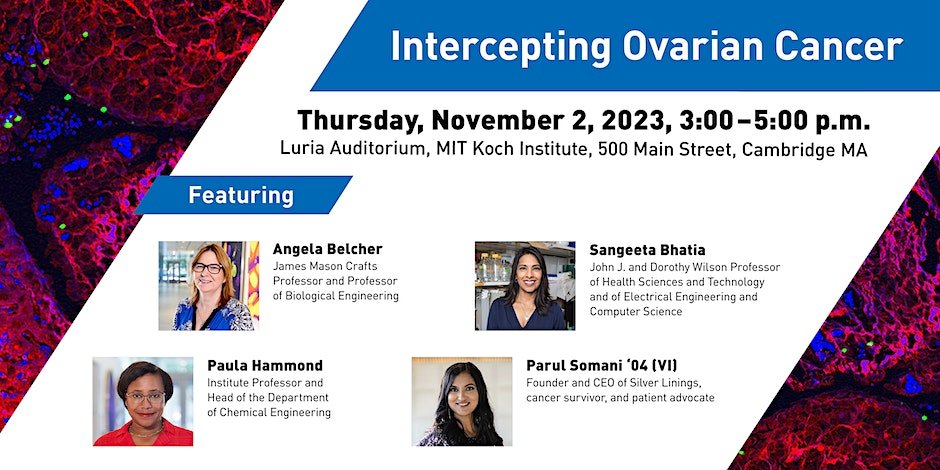October Bulletin
Issue 85
Community Notices
October Research seminar
Next open Marble Center seminar is on Monday October 16 (4-5pm, Luria Auditorium) with a presentation by Dr. Qian Zhong of the Bhatia lab on “Engineering conditional fusogenic liposomes for direct cytosolic delivery.“ Following his talk, we will host a hot topic discussion presented by Dr. B.J. Kim of the Irvine lab on “Nanomedicine: Which Cancers To Treat,” inspired by this publication and upcoming symposium sponsored by NCI held this November.
A busy month for nanotechnology!
It has been an incredible month so far for nanotechnology. Drs. Kati (Katalin) Karikó and Drew Weissman were awarded the Nobel Prize in Medicine for pioneering nucleoside base modifications, a key innovation to the mRNA-based COVID-19 vaccines. Dr. Moungi Bawendi, the Lester Wolfe Professor of Chemistry at MIT, won a share of the 2023 Nobel Prize in Chemistry for work on quantum dots, semiconducting nanocrystals that have been incorporated into technologies such as biomedical imaging and computer and television displays.
On October 9, National Nanotechnology Day will be celebrated around the country with community-led events and activities to help raise awareness of nanotechnology, its use in products that enrich our daily lives, and the challenges and opportunities for the future. This date, 10/9, pays homage to the nanometer scale, 10 –9 meters. The theme for this year's National Nanotechnology Day is “Enabling the Nanotechnology Revolution.” This phrase is inspired by the vision statement for the NNI which is to enable “a future in which the ability to understand and control matter at the nanoscale leads to ongoing revolutions in technology and industry that benefit society.”
Drs. Susan Hockfield and Sangeeta Bhatia at the 2023 ABI Conference in Cambridge, MA.
At the Marble Center, we are excited to launch our own YouTube channel with an incredible line-up of talks, hot topics, and panels covering a broad range of disciplines enabled by nanomedicine. Be sure to use the hashtag #NationalNanoDay to share any activities you’re planning in celebration of the world of small!
On Oct. 6, the White House Office of Science and Technology Policy (OSTP) will produce a coordinated discussion from the OSTP Twitter/X account highlighting nanotechnology’s impact on our world, recent discoveries about materials at the nanoscale, and what nanotechnologies will enable in the future.
The U.S. Food and Drug Administration will hold a symposium on Oct. 11 on the continuous manufacturing of nanomaterials.
Register Now: Intercepting Ovarian Cancer
Professors Belcher, Bhatia, and Hammond will present their multi-dimensional approaches to tackling the challenge of early detection in ovarian cancer and their technologies that could identify new ovarian cancer biomarkers. They will be joined by MIT alumna Parul Somani, who will share her experiences as a BRCA1 carrier, breast cancer survivor, ovarian cancer previvor, and cancer care-giver. A dessert reception in the KI Public Galleries will follow.
Save the date! Spatial Biology Lunch and Learn seminar (Co-hosted by Leica and the Marble Center)
Join the Leica team and other MIT researchers to explore the latest technologies and research that utilize spatial mapping to uncover molecular insights in oncology, neurology, and immunology.
In the News
An implantable device could enable injection-free control of diabetes
(MIT News) A promising approach to treating Type 1 diabetes is implanting pancreatic islet cells that can produce insulin when needed, which can free patients from giving themselves frequent insulin injections. However, one major obstacle to this approach is that once the cells are implanted, they eventually run out of oxygen and stop producing insulin. To overcome that hurdle, MIT engineers have designed a new implantable device that not only carries hundreds of thousands of insulin-producing islet cells, but also has its own on-board oxygen factory, which generates oxygen by splitting water vapor found in the body.
Dr. Siddharth Krishnan Convergence Scholar Class of 2021 (Anderson Lab).
The researchers showed that when implanted into diabetic mice, this device could keep the mice’s blood glucose levels stable for at least a month. The researchers now hope to create a larger version of the device, about the size of a stick of chewing gum, that could eventually be tested in people with Type 1 diabetes. “You can think of this as a living medical device that is made from human cells that secrete insulin, along with an electronic life support-system. We’re excited by the progress so far, and we really are optimistic that this technology could end up helping patients,” says Daniel Anderson, a professor in MIT’s Department of Chemical Engineering, a member of MIT’s Koch Institute for Integrative Cancer Research and Institute for Medical Engineering and Science (IMES), and the senior author of the study.
MIT Research Scientist Siddharth Krishnan, Convergence Scholar Class of 2021, is the lead author of the paper, which appeared in the Proceedings of the National Academy of Sciences. The research team also includes several other researchers from MIT, including Robert Langer, the David H. Koch Institute Professor at MIT and a member of the Koch Institute, as well as researchers from Boston Children’s Hospital. Read more…
Cover feature for the Hammond and Belcher Lab’s STING Protein-Vaccine
The cover image from the journal Advanced Healthcare Materials shows an immunologically cold tumor microenvironment being stimulated by an immunological protein complex, designed to boost and sustain T cell (bright golden) attacks on tumor cells (dark blue). The complex is repurposed from the stimulator of interferon genes (STING) protein, with its agonist binding site highlighted at the bottom. Intratumoral injections of this therapeutic eradicates tumors in mouse models of colon cancer and melanoma with long-term protection from recurrence. More details can be found in the article here.
Congratulations to Marble Center poster winners at the 2023 Nanotechnology Drug Delivery Symposium!
Big shoutout to our fellow Marble Center researchers and collaborators for winning best poster awards at this year’s NanoDDS conference, including Drs. B.J. Kim, Parisa Yousefpour, Simone Douglas-Green, Jason Zhang, and Theresa Raimondo. Big thank you to the conference co-chairs, Drs. Natalie Artzi & Jinjun Shi!
Jobs
Tenure Track Faculty Position, Biomedical Engineering, University of Delaware.
The Biomedical Engineering Department at the University of Delaware (UD) invites applications for a tenure-track/tenured faculty position in Computational Modeling and/or Imaging. Research areas may include, but is not limited to, predictive modeling of physiological mechanisms in health and disease, advanced methods of biomedical data analysis, acquisition or reconstruction algorithms for imaging/sensing, and automated analysis/interpretation of high-dimensional biomedical imaging data. Read more…
Research Chemist, National Institute of Standards and Technology (NIST).
The successful candidate will conduct experiments to study nanoscale materials for use in next generation devices with a focus on processing, including chemical processing and nanofabrication techniques, and characterization including various spectroscopic methods, and prototype development for applications. Read more…
Funding opportunities
| Funding Source | Grant ID | Deadline | Lustgarten Foundation-AACR Career Development Award for Pancreatic Cancer Research | N/A | October 16, 2023 | Melanoma Research Alliance: Pilot Award | N/A | November 3, 2023 |
|---|
















